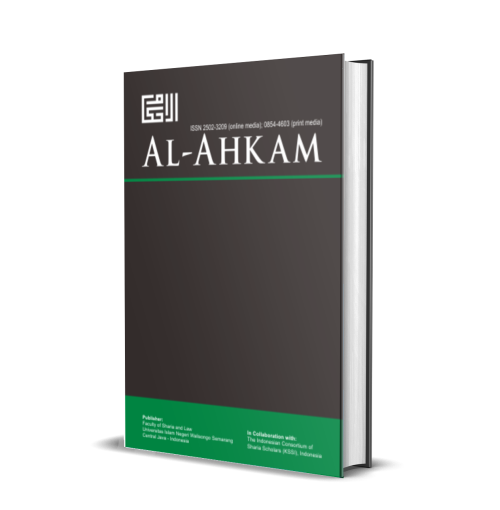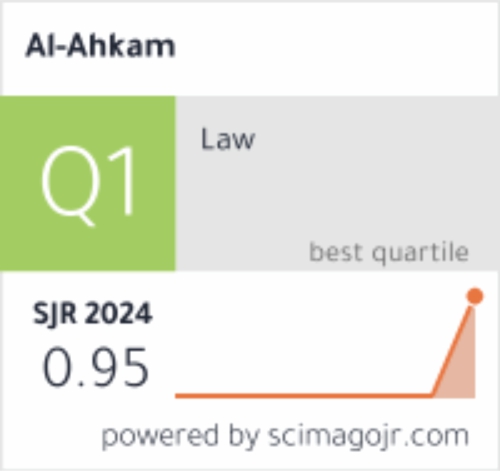Gus Dur’s Ijtihād Paradigm of Contemporary Fiqh in Indonesia
DOI:
https://doi.org/10.21580/ahkam.2019.29.2.4193Keywords:
radical, contemporary, fiqh, ijtihād, equality, PancasilaAbstract
This paper reveals Gus Dur's ijtihād paradigm of contemporary fiqh in Indonesia in answering the problems of life. This study is a type of library research by tracing Gus Dur's works, Gus Dur's thought studies and other related scientific studies. This research uses the approach of Milton K. Munitz's thinking and the frame of mind ‘Abd al-Majīd al-Najjār. This research found that the conservative ijtihād paradigm has led to conservative fiqh which is unable to establish dialectics between fiqh norms and socio-cultural and humanitarian values, which can even lead to radical Islamic movements and acts of terrorism. Therefore, Gus Dur's contemporary jurisprudential ijtihād paradigm is needed to build this dialectic. Theoretically, the Gus Dur ijtihād paradigm has characteristics promoting different socio-cultural and humanitarian values from Islamic reformers. In practical terms, the Gus Dur ijtihād paradigm has made Indonesian socio-cultural values a consideration in understanding and applying contemporary fiqh without changing existing fiqh norms. Gus Dur's contemporary fiqh has also become the basis for maintaining the Pancasila ideology, the 1945 Constitution, the Unitary State of the Republic of Indonesia and Unity in Diversity.Downloads
References
Ahmad, Munawar. Ijtihad Politik Gus Dur: Analisis Wacana Kritis. Yogyakarta: LKis, 2010.
Al-Najjār, ‘Abd al-Majīd. Maqāṣid Al-Sharī’ah bi Ab’ād Jadīdah. Beirut: Dār al-Gharb al-Islāmī, 2008.
An-Na‘im, Abdullahi Ahmed. Toward an Islamic Reformation: Civil Liberties, Human Rights and International Law. Syracuse: Syracuse University Press, 1990.
Baedhowi, B. “Islamologi Terapan sebagai Gerbang Analog Pengembangan Islamic Studies: Kajian Eksploratif Pemikiran Mohammed Arkoun.” Epistemé: Jurnal Pengembangan Ilmu Keislaman 12, no. 2 (December 4, 2017): 347–79.https://doi.org/ 10.21274/epis.2017.12.2.347-379.
Barton, Greg. Biografi Gus Dur: The Authorized Biography of Abdurrahman Wahid. Edited by Lie Hua. Yogyakarta: LKis, 2010.
———. Gagasan Islam Liberal di Indonesia: Pemikiran Neo-Modernisme Nurcholish Madjid, Djohan Efendi, Ahmad Wahid, dan Abdurrahman Wahid. Edited by Nanang Tahqiq. Jakarta: Paramadina, 1999.
Chaq, Moh. Dliya’ul. “Pemikiran Hukum Gerakan Islam Radikal Studi Atas Pemikiran Hukum Dan Potensi Konflik Sosial Keagamaan Majelis Mujâhidin Indonesia (MMI) Dan Jamâ’ah Anshârut Tauḥid (JAT | Tafáqquh: Jurnal Penelitian Dan Kajian Keislaman.” Tafaqquh: Jurnal Penelitian Dan Kajian Keislaman 1, no. 1 (2013): 16–42. http://jurnal.iaibafa.ac.id/index.php/tafaqquh/article/view/3.
Dahlan, Moh. “Epistemologi Hukum Islam: Studi atas Pemikiran Abdullahi Ahmed An-Na’im.” UIN Sunan Kalijaga, 2006.
———. Paradigma Ushul Fikih Multikultural Gus Dur. Yogyakarta: Kaukaba Press, 2013.
Dahlan, Moh. “The Hermeneutics Of Authentic Jurisprudence Of Gus Dur In Indonesia.” Al-Risalah 17, no. 01 (January 17, 2017): 11–27. https://doi.org/10.30631/al-risalah.v17i01.18.
Fitriah, Ainul. “Pemikiran Abdurrahman Wahid tentang Pribumisasi Islam.” Teosofi: Jurnal Tasawuf Dan Pemikiran Islam 3, no. 1 (October 7, 2013): 39–59. https://doi.org/10.15642/teosofi.2013.3.1.39-59.
Georgiadou, Andri. “Reflections from EDI Conference: Equality, Diversity, Inclusion and Human Rights in Times of Austerity.” Equality, Diversity and Inclusion. Emerald Group Publishing Ltd., 2016. https://doi.org/10.1108/EDI-09-2016-0077.
Halim, Abdul. “Membangun Teori Politik Hukum Islam di Indonesia.” AHKAM : Jurnal Ilmu Syariah 13, no. 2 (August 7, 2013): 259–69. https://doi.org/10.15408/ajis.v13i2.938.
HAM, Musahadi. “The Dimension of Tawḥīd in the Development of Islamic Law Institution: Quranic Exegesis Perspective.” Al-Ahkam 27, no. 2 (December 1, 2017): 179. https://doi.org/10.21580/ahkam.2017.27.2.1600.
Jati, Wasisto Raharjo. “Kearifan Lokal sebagai Resolusi Konflik Keagamaan.” Walisongo: Jurnal Penelitian Sosial Keagamaan 21, no. 2 (December 15, 2013): 393–416. https://doi.org/10.21580/WS.21.2.251.
Majid, Nurcholish. “Kebebasan Nurani (Freedom of Conscience) dan Kemanusiaan Universal sebagai Pangkal Demokrasi, Hak Asasi dan Keadilan.” In Demokratisasi Politik, Budaya dan Ekonomi, edited by Elza Peldi Taher, 1st ed., 241. Jakarta: Yayasan Paramadina, 1994.
Majid, Nurcholish, Komaruddin Hidayat, and 1968- Ahmad Gaus A. F. Passing over : Melintasi Batas Agama. Jakarta: Penerbit PT Gramedia Pustaka Utama bekerjasama dengan Yayasan Wakaf Paramadina, 1998.
Mudzakkir, Amin. “Mintoritisasi Ahmadiyah di Indonesia.” Masyarakat Indonesia 37, no. 2 (January 16, 2011): 1–24. https://doi.org/10.14203/JMI.V37I2.650.
Munitz, Milton Karl. “Contemporary Analytic Philosophy.” New York: MacMillan Publishing Co. Inc., 1981.
Nata, Abuddin. Tokoh-Tokoh Pembaruan Pendidikan Islam di Indonesia. Jakarta: Raja Grafindo Persada, 2005.
Pimpinan MPR dan Tim Kerja Sosialisasi MPR Periode (2009-2014). Empat Pilar Kehidupan Berbangsa dan Bernegara (2012).
Rahman, Mujahid Zulfadli. “Gus Dur, HAM, dan Perdamaian,” 2013. http://www.gusdurian.net/id/article/opini/GusDur-HAM-Perdamaian/.
Rifai, Muhammad. Gus Dur, KH Abdurrahman Wahid Biografi Singkat 1940-2009. Jakarta: Ar-Ruzz Media, 2010.
Rochmat, Saefur. “The Fiqh Paradigm for the Pancasila State: Abdurrahman Wahid’s Thoughts on Islam and the Republic of Indonesia.” Al-Jami’ah 52, no. 2 (2014): 309–29. https://doi. org/10.14421/ajis.2014.522.309-329.
Sessler Bernstein, Ruth, and Diana Bilimoria. “Diversity Perspectives and Minority Nonprofit Board Member Inclusion.” Equality, Diversity and Inclusion: An International Journal 32, no. 7 (November 4, 2013): 636–53. https://doi.org/10.1108/EDI-02-2012-0010.
Setiyanto, Danu Aris. “Konstruksi Pembangunan Hukum Keluarga di Indonesia Melalui Pendekatan Psikologi.” Al-Ahkam 27, no. 1 (June 9, 2017): 25. https://doi.org/10.21580/ahkam.2017.27.1.1183.
Sulistyo, Eko. Jokoway : Cara Memahami Kepemimpinan Jokowi. Jakarta: Kantor Staff Presiden Republik Indonesia, 2017.
Tempo.co. “Mahfud: Karena Gus Dur Kata Assalamualaikum Populer Digunakan Umat Lain.” Tempo, 2010. https://nasional.tempo.co/ read/239017/mahfud-karena-gus-dur-kata-assalamualaikum-populer-digunakan-umat-lain.
Umaya, Nazla Maharani. “Ideologi dan Wacana Kognisi Keagamaan di Pondok Pesantren Tradisional dalam Gema Santri.” IBDA`: Jurnal Kajian Islam dan Budaya 16, no. 2 (November 8, 2018): 276–86. https://doi.org/10.24090/ibda.v16i2.1680.
Wahid, Abdurrahman. Islamku, Islam Anda, Islam Kita: Agama Masyarakat Negara Demokrasi. Jakarta: The Wahid Institute, 2006.
———. Pergulatan Negara, Agama, dan Kebudayaan. Jakarta: Desantara, 2001.
———. Prisma Pemikiran Gus Dur. Yogyakarta: LKiS, 2000.
———. Sekedar Mendahului: Bunga Rampai Kata Pengantar. Jakarta: Nuansa, 2011.
———. “Universalisme Islam dan Kosmopolitanisme Peradaban Islam.” In Kontekstualisasi Doktrin Islam Dalam Sejarah, edited by Budhy Munawar Rachman, 1st ed., 731. Jakarta: Yayasan Paramadina, 1995.
Zirmansyah. Pandangan Masyarakat Terhadap Tindak Kekerasan atas Nama Agama: Studi Hubungan antara Pemahaman Keagamaan dengan Tindak Kekerasan atas Nama Agama. Edited by Bashori A. Hakim. 1st ed. Jakarta: Kementerian Agama RI, Badan Litbang dan Diklat, Puslitbang Kehidupan Keagamaan, 2010.
Downloads
Published
How to Cite
Issue
Section
License
By submitting an article to the journal, the author(s) agree to transfer the published article's copyright to the journal, which will act as the publisher. This means the journal will have the right to publish the article in various forms, including reprints. The journal will maintain the publishing rights to the published articles.
In line with the license, authors and third parties (readers, researchers, and others) are allowed to share and adapt the material. In addition, the material must be given appropriate credit, provided with a link to the license, and indicated if changes were made. If authors remix, transform or build upon the material, authors must distribute their contributions under the same license as the original.




